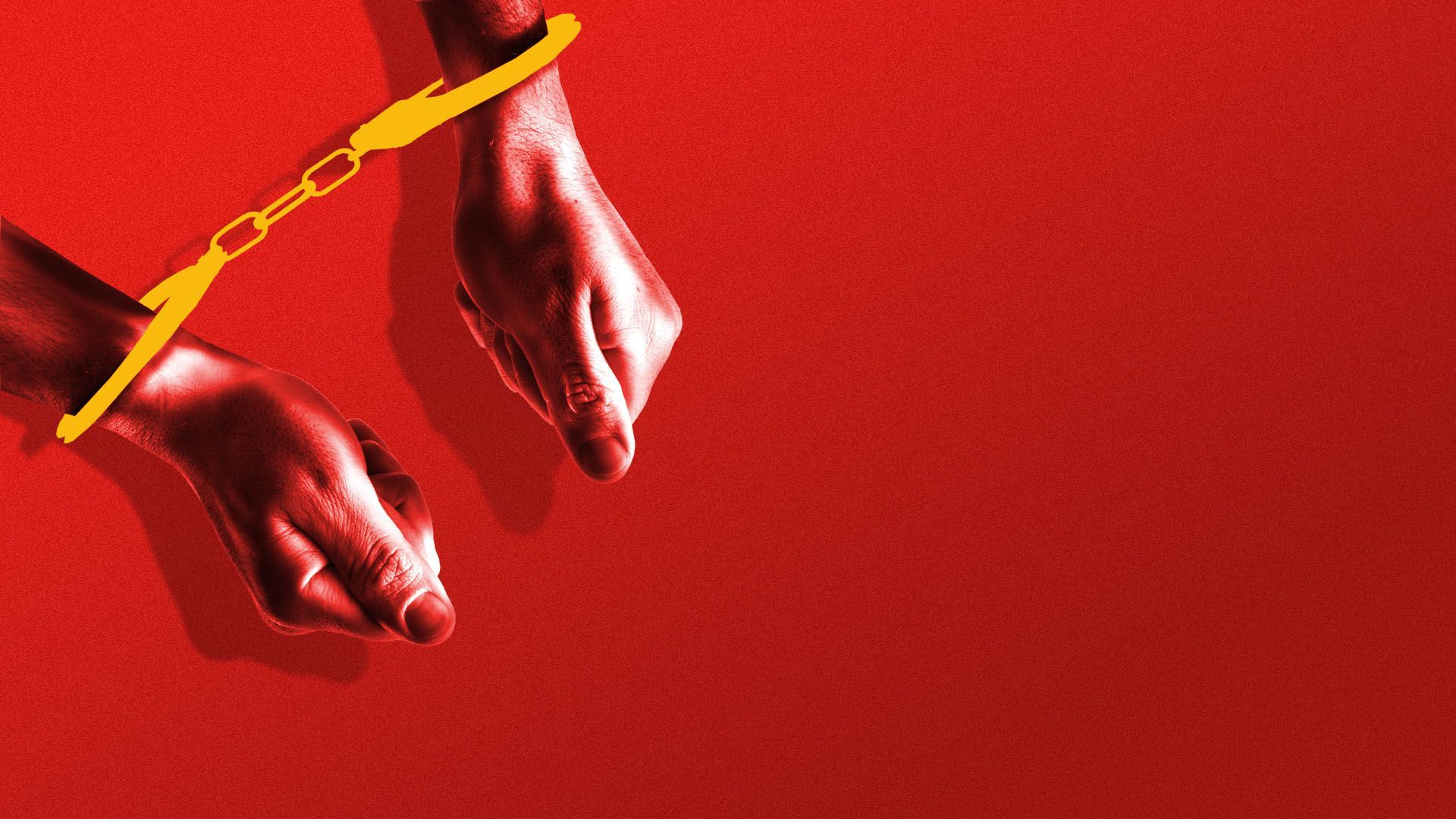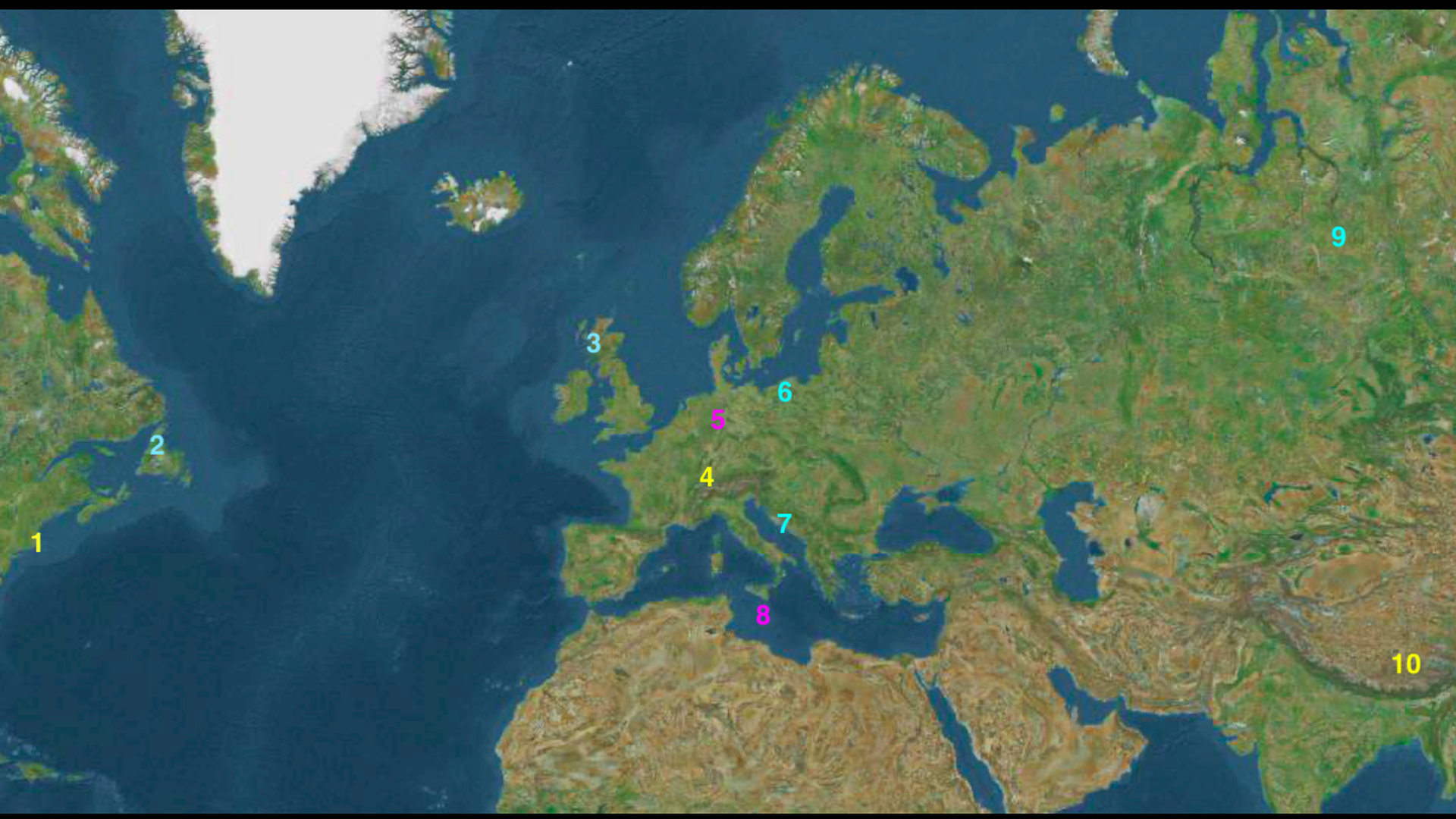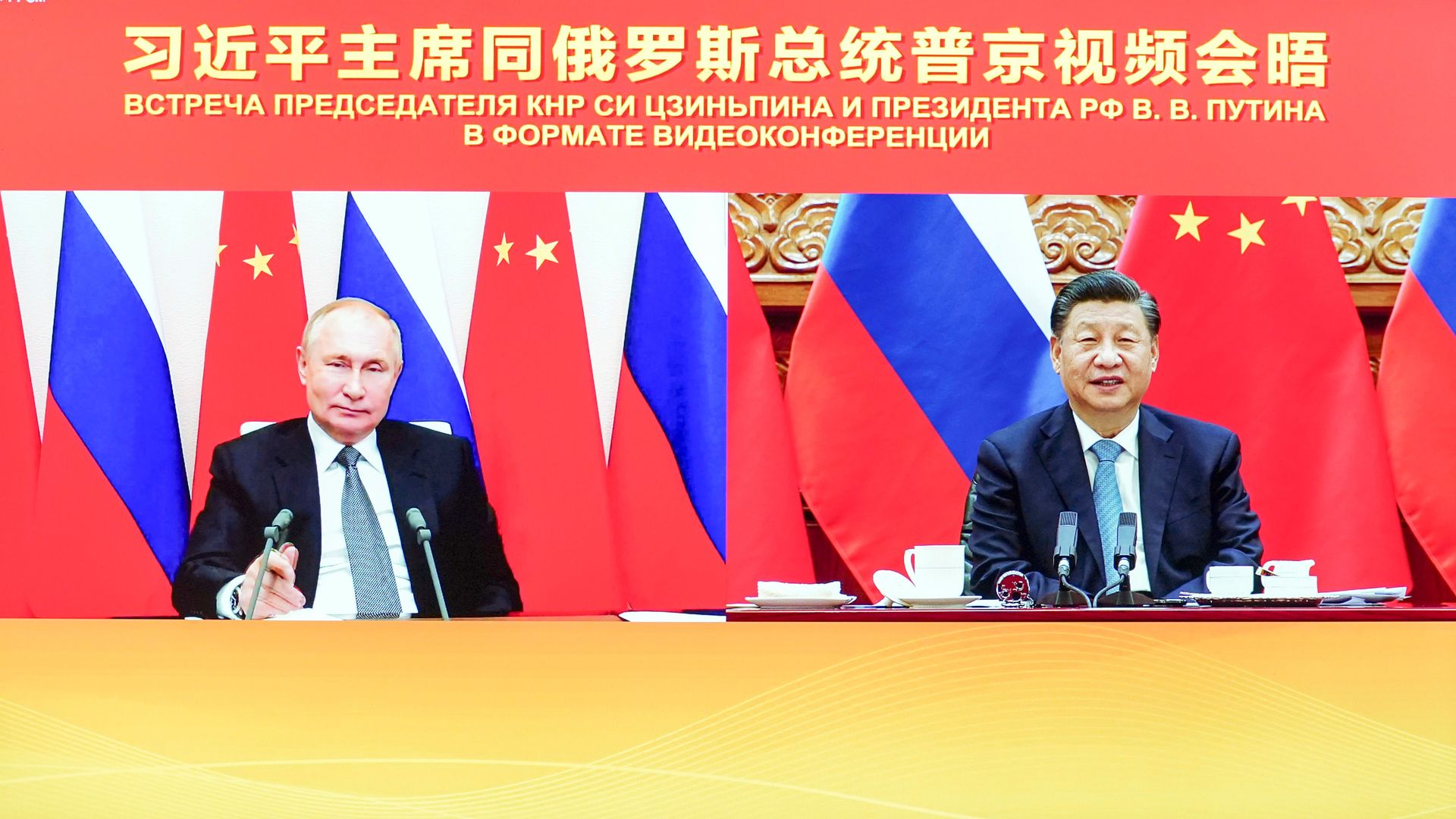| | | | | | | Presented By The Economist | | | | Axios World | | By Dave Lawler ·Dec 16, 2021 | | Welcome back to Axios World for our penultimate edition of the year. - We're taking off tonight (1,930 words, 7 minutes) from Chile.
- I hope you enjoy today's Where in the World. I had a lot of fun making it. And yes, I know it's a hard one.
New arrival? Subscribe. | | | | | | 1 big thing: Chile's anti-establishment election |  | | | Kast (left) and Boric. Photo: Marcelo Hernandez/Getty Images | | | | Two new polls ahead of Sunday's presidential election in Chile show far-right former congressman Jose Antonio Kast threatening to eclipse his left-wing rival, Gabriel Boric. Why it matters: Chile has long been a byword for stability and prosperity in the region, but protests beginning in 2019 — sparked by a small hike in metro fares — thrust the country into a fierce debate over economic inequality and national identity. Two very different visions of Chile's future are on the ballot. - A constitutional convention consisting largely of political newcomers, many of them from the left, is currently working to rewrite Chile's constitution, written during the era of dictator Augusto Pinochet (1973–1990).
- Since Pinochet left power, a succession of center-left and center-right governments have overseen enviable economic growth. Chile has Latin America's highest GDP per capita and second-lowest poverty rate, next to Uruguay.
- But as incomes stagnated in the past decade, frustrations about inequality increased. And as Chile grew richer, the younger generations helped bring social and environmental issues to the fore, says Robert Funk, a political scientist at the University of Chile.
Breaking it down: If Boric symbolizes that shift in the status quo, Kast epitomizes the resistance to it. - Kast skillfully "lumps together" the issues of migration, drugs, crime and the indigenous uprisings in the south of the country, Funk says, though he does so in softer tones than Jair Bolsonaro, to whom he's often compared.
- Like Bolsonaro, Kast spent years as a backbench congressman before the political winds started to blow in his direction. He has resisted comparisons to Donald Trump, but met with Sen. Marco Rubio (R-Fla.) on a recent visit to Washington.
- Running on a law-and-order platform, the socially conservative father of nine has praised Pinochet's legacy, proposed a border trench to keep out migrants, and opposed the decision last week by Chile's Congress to legalize same-sex marriage.
The other side: Boric, 35, got his start in leftist student politics. He has criticized previous left-of-center governments as overly cautious and is backed by a coalition that includes Chile's Communist Party. "If Chile was the birthplace of neoliberalism," he promised voters, "it will also be its grave." - Still, he describes himself as a social democrat, seeking to emulate Scandinavia rather than Cuba or Venezuela, says Funk.
- He's also tried to moderate his image during the runoff by adding the Chilean flag to his electoral backdrops and trimming his beard.
- His pitch to voters has more in common with the younger progressives in Washington than Chavistas in Caracas. Still, many Chileans worry that once in office he'll be under the influence of the hard left.
State of play: Kast narrowly topped the first round of voting last month, but Boric seemed to have a clear lead in the head-to-head polling. However, a poll released Tuesday showed that lead down to 3 points, and another published Thursday had both candidates at 48%. The bottom line: The anti-establishment wave isn't unique to Chile, but it seems likely to change the country in profound ways, Funk says. "I think the last 30 years of Chilean politics — old, boring, stable Chile — is gone. We're not going to go back." |     | | | | | | 2. State of the outbreak: Spreading fast |  Data: Our World in Data; Chart: Axios Visuals It's beginning to look a lot like an Omicron winter wave. Zoom in: The U.K. recorded a record-high 88,376 cases today, continuing a sharp upward trajectory over the past four days that appears to be driven by the new variant. - Prime Minister Boris Johnson is caught between his scientific advisers, who are issuing increasingly dire warnings, and Conservative backbenchers who resist any additional restrictions.
- France announced restrictions on travel from the U.K. today, though such steps appear increasingly futile. European Commission President Ursula von der Leyen has said Omicron is likely to be the dominant strain across the continent by mid-January.
- The U.K. is ramping up its booster program, which has already seen 43% of over-12s get a third shot (more than double the rate in the U.S.).
What to watch: Experts continue to hope infections from Omicron tend to be milder than from the Delta variant. The data paints a mixed picture. - Vaccines appear significantly less effective at preventing infection from Omicron, but still by far the best protection against hospitalization and death.
More pandemic headlines: - South Korea announced new measures today to combat a surge in cases. Bars will have to close at 9pm and gatherings will be limited to four people. In an unprecedented step, teens will have to be vaccinated to access public buildings.
- Vaccine passports drive up vaccinations, a new study confirms.
- The variant is hitting the sports world hard. I write that as the fan of a team that has now had three straight games postponed.
|     | | | | | | 3. A big day of China action in D.C. |  | | | Illustration: Sarah Grillo/Axios | | | | Congress unanimously passed a bill today to punish the Chinese government for its genocide of Uyghurs and other ethnic minorities, Axios' Zach Basu reports. Driving the news: The Uyghur Forced Labor Protection Act will ban all imports from the Chinese region of Xinjiang unless the U.S. government determines with "clear and convincing evidence" that they were not made with forced labor. - The White House confirmed this week that President Biden would sign the bill, after months of allegations from Republicans that the administration was quietly fighting it over concerns about solar panel production (Xinjiang accounts for nearly 50% of a key raw ingredient).
- Major corporations like Nike and Coca-Cola had lobbied against the bill due to its effects on supply chains.
- Human rights activists say the bill will impose the first tangible costs against the Chinese government for its mass detentions in Xinjiang — and could set a precedent for other countries to follow.
In a bipartisan compromise, Sen. Marco Rubio (R-Fla.) also agreed to lift his hold on Nick Burns' nomination as ambassador to China. - Meanwhile, the Commerce Department blacklisted China's top military medical research institute and 11 affiliates over concerns about Beijing's development of biometrics and "brain-control" weapons.
- And the Treasury Department added eight Chinese companies — including DJI, the world's largest commercial drone manufacturer — to an investment blacklist for facilitating the surveillance of Uyghurs.
Go deeper: U.S. sanctions Chinese tech companies over abuse of Uyghurs |     | | | | | | A message from The Economist | | Enjoy holiday reason | | |  | | | | Enjoy 50% off an annual digital subscription in our holiday sale. Create your own pathway to discovery with our many digital features and benefits including economist.com, the app, audio versions, podcasts, newsletters and live webinars. Subscribe | | | | | | Bonus: Where in the world? |  | | | Screengrab via Apple Maps | | | | Today's puzzle has a theme: places after which dog breeds are named (not necessarily where the breed originated). I've done some color coding: Yellow numbers denote a city, blue numbers denote a region and purple numbers denote a country. So if I'd included an Algerian Retriever, Algeria would be marked in purple. Can you name all 10 breeds? Scroll to the bottom for the answers. I'll be very impressed if you get No. 6. |     | | | | | | 4. Mapped: Crises to watch in 2022 |  Data: International Rescue Committee; Map: Jacque Schrag/Axios The 20 countries mapped above comprise around 10% of the global population but 89% of humanitarian need, according to the International Rescue Committee's annual emergency watchlist. - Topping the list is Afghanistan, where 97% of the population could be living in poverty by mid-2022 due in part to a steep decline in international aid and to the freezing of central bank assets by the U.S.
- Ethiopia comes next. Yemen fell from first to third "not because of an improvement in the humanitarian situation but because crises in other countries are worsening even more rapidly," according to the report.
- IRC CEO David Miliband writes that the world is experiencing "system failure," with states failing their citizens and international diplomatic, legal and humanitarian efforts failing to fill the gap.
Full report. |     | | | | | | 5. Great power politics roundup |  | | | Putin chats with Xi. Photo: Yin Bogu/Xinhua via Getty | | | | 1. A German court ruled Wednesday that a former Chechen separatist fighter murdered in broad daylight in a Berlin park in 2019 was killed by a member of Russia's FSB intelligence agency, on the orders of the Russian government. - Germany summoned Russia's ambassador and expelled two diplomats, new Foreign Minister Annalena Baerbock announced.
- The Kremlin has rejected the ruling but said it shouldn't affect relations with new chancellor Olaf Scholz.
- Russia's representative to the EU, meanwhile, has described the delay in certification of the Russia-to-Germany Nord Stream 2 gas pipeline as "nothing but politics."
- Germany's energy regulator says approval won't come in the first half of next year, and Scholz is under pressure to use the pipeline as leverage against a potential Russian invasion of Ukraine.
2. Vladimir Putin and Xi Jinping used a 90-minute video call on Wednesday to profess solidarity with each other's interests. - Putin said he looked forward to attending the Olympics. Xi backed Putin's push for security guarantees over Ukraine. They both talked about "noninterference in domestic affairs," a principle the countries seem to apply very selectively.
3. Guatemalan President Alejandro Giammattei told the FT that China had dangled coronavirus vaccines to convince him to sever diplomatic ties with Taiwan, as Nicaragua did last week and Honduras is preparing to do, but he refused. - State of play: Outside of those Northern Triangle countries, only 14 states recognize Taiwan, and all of them have populations around or below 1 million except for Haiti and Paraguay.
4. China has launched an asymmetrical trade war against Lithuania since the Baltic country allowed Taiwan to open a diplomatic mission in Vilnius, and the EU seems powerless to do much about it. |     | | | | | | 6. Trump felt used by Israel on Soleimani strike |  | | | Donald Trump walks away from the podium after announcing Soleimani's death. Photo: Jim Watson/AFP via Get | | | | The assassination of Iranian commander Qasem Soleimani in January 2020 seemed like the height of U.S.-Israel cooperation, but it actually became a major point of tension between the allies, Axios' Barak Ravid reports in his new book. Behind the scenes: Donald Trump expected Israel to play a more active role in the attack, and he griped that then-Prime Minister Benjamin Netanyahu was "willing to fight Iran to the last American soldier," according to a former senior Trump administration official. Trump himself told Barak, "Israel did not do the right thing." - "I can't talk about this story. But I was very disappointed in Israel having to do with that event. ... People will be hearing about that at the right time," Trump said.
Between the lines: It's unclear if Trump's anger is entirely justified. A senior Israeli defense official told me that Israel proposed a more active role for Israeli forces but the U.S. insisted on being the ones to execute the strike. - Israel also provided the U.S. with key intelligence support, including tracking Soleimani's cellphone, Yahoo News reported.
- The former senior U.S. official said Trump's anger wasn't totally warranted, but that he put the episode into the same box he had put his feelings for NATO — of allies wanting the U.S. to do their fighting for them.
Warranted or not, the episode stuck with Trump during his last year in office. - Netanyahu tried to pull Trump aside to make amends when he visited the White House in September 2020 for the signing of the Abraham Accords, but Trump wasn't convinced and continued to believe Netanyahu had used him.
Go deeper |     | | | | | | 7. Stories we're watching |  | | | Getting the shot, in Chinhoyi, Zimbabwe. Photo: Tafadzwa Ufumeli/Getty Images | | | - Haitian gang releases 12 kidnapped missionaries
- Democracy in decline; China touts "socialist democracy"
- Netanyahu hasn't spoken to Trump after "f**k him"
- Biden picks Kennedy and Kwan as ambassadors
- Typhoon strikes Philippines
- Iran agrees to renewed inspections as nuclear talks stall
- Malta legalizes pot
Quoted: "From that day [when he was awarded the Nobel Prize], Abiy felt he was one of the most influential personalities in the world. He felt he had a lot of international support, and that if he went to war in Tigray, nothing would happen. And he was right." — Gebremeskel Kassa, a former senior official under Ethiopian Prime Minister Abiy Ahmed, to the NYT. |     | | | | | | A message from The Economist | | Enjoy holiday reason | | |  | | | | Enjoy 50% off an annual digital subscription in our holiday sale. Create your own pathway to discovery with our many digital features and benefits including economist.com, the app, audio versions, podcasts, newsletters and live webinars. Subscribe | | | | Answers: 1. Boston Terrier (Boston, U.S.). 2. Labrador (Newfoundland and Labrador, Canada). 3. West Highland Terrier, or "Westie" (West Highlands, Scotland). 4. Bernese Mountain Dog (Bern, Switzerland — could also have marked as region/canton). 5. German Shepherd (Germany). 6. Pomeranian (Pomerania, historical region of Poland and Germany). 7. Dalmatian (Dalmatia, Croatia). 8. Maltese (Malta). 9. Siberian Husky (Siberia). 10. Lhasa Apso (Lhasa, Tibet). |  | Bring the strength of Smart Brevity® to your team — more effective communications, powered by Axios HQ. | | | | | | Axios thanks our partners for supporting our newsletters. If you're interested in advertising, learn more here.
Sponsorship has no influence on editorial content. Axios, 3100 Clarendon Blvd, Suite 1300, Arlington VA 22201 | | | You received this email because you signed up for newsletters from Axios.
Change your preferences or unsubscribe here. | | | Was this email forwarded to you?
Sign up now to get Axios in your inbox. | | | | Follow Axios on social media:    | | | | | |












No comments:
Post a Comment